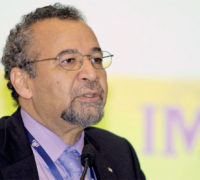
Busting the myths of M&A: 4 steps to success
Busting the myths of M&A: New research reveals why old merger strategies fail and how fresh thinking can lead to lasting value for both sides of the deal....

by Hischam El-Agamy, Jeanett Modise Published May 31, 2024 in Innovation • 11 min read
A truly African brand, Absa Group Ltd is inspired by the people it serves and determined to always be brave, passionate, and ready to make Africa proud.
One of Africa’s largest diversified financial services providers, the group has 37,000 employees in 12 countries across the continent. Headquartered in South Africa and listed on the Johannesburg Stock Exchange (JSE), it provides clients with retail, business, corporate, investment, and wealth management solutions.
In 2016, Absa had a quest for relevance thrust upon it with new urgency. When Barclays, its global investor and majority shareholder for over a decade, exited the partnership, the company suddenly had to go it alone. This entailed designing a new philosophy and growth strategy for its markets across Africa from the ground up by addressing the challenge of intensifying disruption in the banking sector head-on and actively infusing this repositioning with a pan-African culture of resilience.
Absa knew that its people were its biggest asset. What they needed was the right set of tools to tackle the challenges ahead.
Today, in business and in our daily lives, we are exposed to various channels and massive amounts of information that we continuously try not only to learn but classify. Memorizing is not only part of how humans have survived to deal with a particular situation or resolve specific problems, but it also makes a difference between success and failure.
Why, then, do we forget important lessons? Much research has been done on the relationship between memory and learning. The 19th-century German psychologist Herman Ebbinghaus remains a reference in this field.
In 1885, Ebbinghaus studied learning and memory. He developed what he called the “forgetting curve” to illustrate how information, without attempts to retain it, is lost over time. Through his research experiments, he found that without any extra practice, more than 50% of what we learn is forgotten within an hour, two-thirds by the end of the day, and 80% by the end of the month. Forgetting learned materials occurs most rapidly within the first nine hours.
Ebbinghaus’s experiments, however, excluded the impact of physiological factors such as lack of sleep or hunger, or psychological factors such as stress or anxiety.
Ebbinghaus’s model is still a guiding principle in designing successful learning experiences for youths, managers, and executives. His research showed that learners’ memories and developmental capabilities are significantly enhanced when educational experiences – whether in classrooms or through other experiential learning formats – are structured as a learning journey.
The effectiveness of these learning journeys is further amplified when learners use the intervals between classroom sessions to engage in real projects or initiatives. This practical application enables learners to apply their acquired knowledge to solve business challenges, enhance process efficiency, and, in certain cases, generate new ideas, fostering a culture of intrapreneurship within the organization. Such learning experiences not only elevate individuals to the next level of personal development but also add value and drive transformation.
In 2019, Absa partnered with IMD to design four distinct learning journeys for the bank’s young talent, middle managers, and senior executives. Each journey would target their specific needs – as well as their personal and professional growth potential – while fostering dialogue and collaboration between the four cohorts. Between 2019 and 2023, the journeys lasted between 7-10 months and contributed to the development of around 500 managers and executives.
In line with IMD’s motto of Real Learning, Real Impact, the remit was to personalize the learning and integrate it tightly with practice. To address Absa’s demand for real-world engagement, it was also imperative that the programs revolved around hands-on project work and cast new light on the needs of Absa’s stakeholders. The participants, divided into teams, worked on more than 50 Absa enterprise projects to enhance the organization’s efficiency, implement breakthrough innovation, and create value for the community on the continent.
The following enterprise projects have brought innovation to various parts of the ecosystem: building a new value proposition for Absa employees, improving a client reward system, “Drive To Own” systems that help drivers manage cash and gradually own their rented cars, developing platforms for Africa Low-Cost Housing Solutions, the “Absa Waste Bank” to integrate waste collection workers into the banking system, and many others.
In Zambia, the “Smart Queue” concept has been successfully tested, both on the web and as a smartphone app, and has been expanded to improve customer service. It not only benefits clients but has significant revenue potential for Absa.
“One of the goals was to embed new habits and practices traditionally associated with startups – speed, customer-centricity, hands-on learning, agile experimenting, and prototyping.”
Through a combination of custom modules, open enrolment programs, coaching, pre- and post-workshop learning, and intrapreneurial customer-focused projects in several countries, the Absa L&D initiative is aimed at accelerating the development of a thriving entrepreneurial culture. One of the goals was to embed new habits and practices traditionally associated with startups – speed, customer-centricity, hands-on learning, agile experimenting, and prototyping.
Absa’s approach to digital transformation would also have to be informed by African specificity and relevance. Around the world, as financial services were grappling with intensifying competition and the incursion into their traditional territory by fintech and other startup players, increasingly internet- and smartphone-savvy African consumers, with their rich tradition of leapfrogging entire waves of technology adoption coupled with convenience, were ready to embrace the new waves of tech disruption.
Entering the Learning and Development partnership, Absa and IMD were fully conscious of the bank’s mandate to play a shaping role in Africa’s growth and sustainability.
Together with Absa’s interventions, the combination of IMD’s content, teaching, and coaching ensured that learning did not stop in the sessions but found its way directly into the organization. As well as aligning mindsets, it generated a shared sense of urgency about Absa’s transformation.
By bringing together Absa’s current and future leaders, the programs allowed them to adopt new frameworks and tools, use the tools to analyze, discover, and benchmark, and create new mentoring relationships and business opportunities that had a positive impact on several stakeholders while creating value for the organization.
Entering the Learning and Development partnership, Absa and IMD were fully conscious of the bank’s mandate to play a shaping role in Africa’s growth and sustainability. Reinforcing the strategic intent to be an “Active Force for Good,” participants approached their learning and project work intending to bring economic and social good to the community, in several cases leapfrogging previous waves of technology adoption.
Among the enterprise projects developed in South Africa and throughout the continent are new platforms to fund sustainable manufacturing, new systems to support farmer trading, and optimized funding for micro and small enterprises which developed a specific platform for working women (a women’s bank).
In Kenya, payment of school fee installments – and their reconciliation – are still largely handled manually by local schools, their 24 million students, and parents/guardians. Young talents from Kenya developed a digitally enabled solution that services schools, students, and parents/guardians – a solution that allows families to manage their budgets and to have rapid and efficient reconciliation with the school system.
In Botswana, another young talent team has transformed traditional African group saving into a product and platform that helps safeguard group contribution and ensures transparency for informal workers – and solicits consent from members for any withdrawals.
Having emerged with a sense of renewal from the learning journeys, and in collaboration with IMD, Absa continues to invest in talent development to implement the learning journeys approach for four managerial levels. In 2024, the two organizations reinforced their partnership, continuing this unique learning experience into a fifth year.
“Africa is a region of paramount importance for the world and for IMD,” says IMD President Jean-François Manzoni. “Collaborating with our partners at Absa has been a true testament to our core values of developing leaders who transform organizations and contribute to society. The insight, engagement, and contributions generated through this joint program are clear examples of global collaboration at its best, working to find creative solutions to accelerate growth, increase impact, and to do well by doing good.”
Absa is repositioning itself as a confident, digitally transforming player. Its focus and momentum remain on the customer and front line. Living up to its commitment to fuel growth across the African continent, its leaders are spearheading and successfully implementing tech-powered and other innovative projects that create real impact for local communities – country-based as well as pan-African.
The Absa Group is steadily becoming a force to reckon with in the continent’s transformation. This is aligned with the Group’s purpose of “Empowering Africa’s tomorrow, together… one story at a time.”
The authors wish to thank Nadia Ten Cate from Absa Academy and Karin Ahlner from IMD for their significant contributions and efforts in fostering the successful partnership between Absa and IMD.

IMD Executive Director, Middle East, Africa and Turkey
As Executive Director of IMD, Hischam El Agamy is responsible for IMD’s activities in Africa, the Middle East, and South-Central Asia, where he teaches and leads development programs. El Agamy’s expertise and teaching experience include scenario planning, business transformation, family business transformation, public-private partnership, and stakeholder engagement. He teaches regularly in IMD custom programs and has taught several IMD open programs, including its EMBA and MBA programs.
For over 14 years, El Agamy has occupied various international functions in seven European countries as part of a long career with major Swiss multinational corporations in Zürich. During these years, he has driven a number of business transformation initiatives in several European countries.
He has contributed to several advisory assignments for governments in the Gulf region and in the area of competitiveness and human capital development for the government of South Africa.
El Agamy obtained two master’s degrees in applied science from the University of Fribourg and Lausanne in Switzerland. He received his Doctorate from the University of Pierre & Marie Curie in Paris.

Group Chief Human Capital Officer, Absa Group Limited
Jeanett Modise is Group Chief Human Capital Officer at Absa Group Limited. She has held senior HR roles at several blue-chip companies including Sanlam Group, SAP, AngloGold Ashanti, Industrial Development Corporation, Mutual & Federal, and Hewlett Packard.
Modise is a coach with a passion for people and business. She has held the roles of Executive Director on the Board of JSE-listed Sanlam Limited and Sanlam Life, and as Non-Executive Director and Chair of the Board’s HR & Remuneration committee at Foskor, Non-Executive Director at Cordustex, Indwe Broker Holdings, MiWay Insurance, and at global NGO Save the Children South Africa.
In 2017, she was awarded the Future of HR Hall of Fame Lifetime Award for her contribution to the HR Fraternity and impacting business, performance, and culture through innovative human capital management strategies for more than 10 years.
Modise started her career as a professional nurse and midwife. She holds an MPhil in management coaching from the Stellenbosch Business School, a master’s degree in business leadership, a BCom degree in business management, and an MDP from Unisa, and attended both the Senior Executive Program at Harvard Business School and the Advanced Management Program at Insead.

July 7, 2025 • by Patrick Reinmoeller, Markus Nicolaus in Finance
Busting the myths of M&A: New research reveals why old merger strategies fail and how fresh thinking can lead to lasting value for both sides of the deal....

April 24, 2025 • by Jerry Davis in Finance
Many regional developers have tried and failed to emulate Silicon Valley’s VC-driven model for innovation. Detroit, the birthplace of Ford, is following an alternative route – with promising results....
 Audio available
Audio available
April 23, 2025 • by Karl Schmedders in Finance
CFOs must drive a financially disciplined way to manage environmental risks amid growing pushback against environmental sustainability efforts, explains IMD’s Karl Schmedders....

April 11, 2025 • by Jim Pulcrano in Finance
IMD's Jim Pulcrano interviews Ruchita Sinha, General Partner of venture capital firm AV8 Ventures, and explores her approach to early-stage investing....
Explore first person business intelligence from top minds curated for a global executive audience